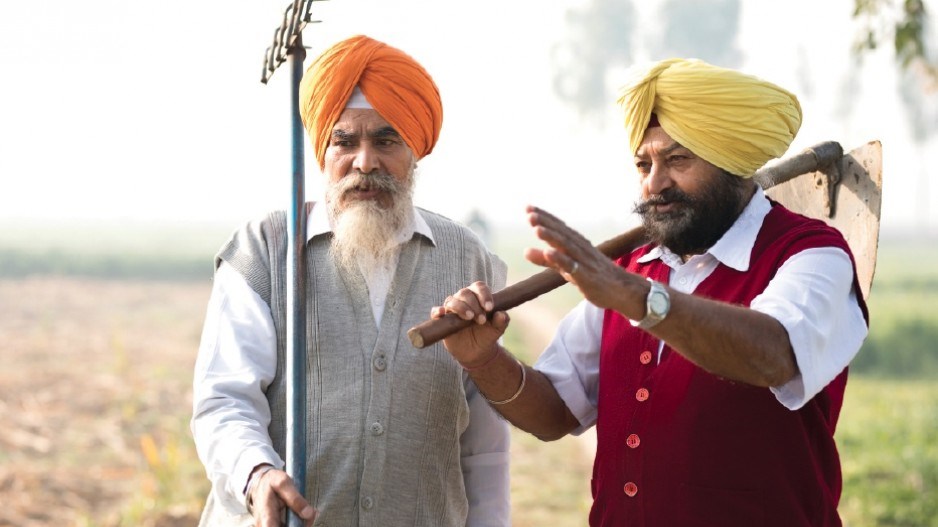Recent protests in India over a controversial set of farm reform bills have spilled over into demonstrations in Vancouver and highlighted the complex relationship between B.C.’s Indian diaspora and its home country.
The protests stem from a trio of laws introduced by the government of Prime Minister Narendra Modi last year that are aimed at reforming India’s struggling agriculture sector by inviting free-market participation, loosening pricing regulations, encouraging the stockpiling of goods and providing for dispute arbitration.
Indian farmers have long relied on being able to sell their crops at the minimum support price (MSP), a guaranteed minimum rate from government-controlled wholesale markets. They now fear the regulations would remove the MSP, allowing major corporations to stockpile crops and drive down prices. That, critics say, would potentially put millions of farmers out of business.
Shashidharan Enarth, an adjunct professor at the University of British Columbia Institute for Resources, Environment and Sustainability, said the fundamental issue in the dispute comes down to trust.
Sixty-seven per cent of Indian farms are held by small farmers with less than one hectare of land. They do not have the margins to absorb the losses that would come from a repeal of the MSP, Enarth said, adding that trust in the fractured, multi-level government and overlapping authorities in India is thin.
The epicentre of the protests is in India’s wealthiest agricultural states: Haryana and Punjab – the latter being the former home of almost half of all Indo-Canadians (668,240 out of 1,374,710 as of 2016) and 79% of the Indo-Canadian community in B.C. (244,485 out of 309,315).
So when the protests in India started, Vancouver and Toronto each saw its own version of the protests because the majority of Indo-Canadians in B.C. identified with the farmers – many of whom are from the Punjab region.
Prime Minister Justin Trudeau’s comment that he “stands by the right of peaceful protest” was carried by media outlets opposing the Modi government and drew strong rebuke from New Delhi. The Indian Ministry of Foreign Affairs called Trudeau’s response “unacceptable interference.”
All this is happening at a time when Canada is increasingly looking to India as its next big potential trade partner – especially given Ottawa’s current difficulties with China over the Meng Wanzhou affair. India offers a market almost equal to the size of China and a much less saturated playing field. That has increased interest from sectors that see India as a way for Canada to diversify trade beyond the United States and China.
The recent friction, one observer said, is an example of the complexities of foreign trade when dealing with another country that does not share the same values or world view.
“The idea of India acting as a balance to China is questionable,” said Asia Pacific Foundation of Canada vice-president of research Jeff Reeves. “When you look at trade agreements like the CPTPP (Comprehensive and Progressive Agreement for Trans-Pacific Partnership) or RCEP (Regional Comprehensive Economic Partnership), India is not a participant to either agreements.… India has traditionally been non-aligned, so the thought of bringing the country online in an alliance may be wishful thinking.”
There is also the issue of overseas diasporas. In B.C., the Chinese and South Korean communities have helped foster cultural and market ties between Canada and their homelands, but that’s not always the case in the Indo-Canadian community, where the majority the Punjabi Sikh demographic is at odds with the Hindu-nationalist-leaning government under Modi – given the community’s previous support of a separatist movement.
“Expat Indians typically have a disproportionately high influence on the way Indian politics is framed,” Enarth said. “The only exception is Punjabis, because much of the Khalistani movement got support from Punjabis overseas, so they have not been able to exert a lot of influence.”
Enarth added that New Delhi had some success in linking the farmer protests to the separatist movement, although New Delhi said on January 20 it is now offering to suspend the implementation of the controversial farm laws to get farm union leaders to call off the protests.
As for Canada’s role, Enarth said it will be an interesting case study for Ottawa’s priorities – as well as a lesson in the complexities of seeking trade and economic opportunities in a pluralistic Asia-Pacific region.
“From the narrow perspective of Canadian economic interest, Canada should be happy if these new farming laws are not repealed,” Enarth said, noting that the law would put many farmers out of business and severely damage India’s ability to produce certain crops.
“If farmers stop growing essential crops, then India would have to import. And if that’s the situation, Canada would be at the front of the line – and the type of goods that Canada exports are the goods that India needs. Canola, oilseeds and wheat.”




